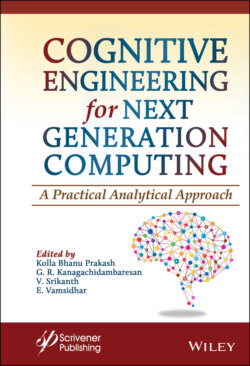Читать книгу Cognitive Engineering for Next Generation Computing - Группа авторов - Страница 15
1.1 Introduction: Definition of Cognition, Cognitive Computing
ОглавлениеThe term Cognition is defined as “The procedure or the method of acquiring information and understanding through experience, thought and the senses” [1]. It envelops numerous parts of procedures and intellectual functions, for example, development of information, thinking, reasoning, attention, decision making, evaluating the decisions, problem-solving, computing techniques, judging and assessing, critical thinking, conception, and creation of language. This process produces new information using existing information. A large number of fields especially psychology, neuroscience, biology, philosophy, psychiatry, linguistics, logic, education, anesthesia, and computer science view and analyze the cognitive processes with a diverse perspective contained by dissimilar contexts [2].
The word cognition dates to the 15th century, derived from a Latin word where it meant “thinking and awareness” [3]. The term comes from cognitio which means “examination, learning or knowledge”, derived from the verb cognosco, a compound of con (‘with’), and gnōscō (‘know’). The latter half, gnōscō, itself is a cognate of a Greek verb, gi(g)nόsko (γι(γ)νώσκω, ‘I know,’ or ‘perceive’) [4, 5].
Aristotle is probably the first person who has shown interest to study the working of the mind and its effect on his experience. Memory, mental imagery, observation, and awareness are the major areas of cognition, hence Aristotle also showed keen interest in their study. He set incredible significance on guaranteeing that his examinations depended on exact proof, that is, logical data that is assembled through perception and principled experimentation [6]. Two centuries later, the basis for current ideas of comprehension was laid during the Enlightenment by scholars, like, John Locke and Dugald Stewart who tried to build up a model of the psyche in which thoughts were obtained, recalled, and controlled [7].
As Derived from the Stanford Encyclopedia of Philosophy the Cognitive science can be defined as “Cognitive science is the interdisciplinary study of mind and intelligence, embracing philosophy, psychology, artificial intelligence, neuroscience, linguistics, and anthropology.”
The approach for cognitive computing depends on understanding the way how the human brain can process the information. The main theme or idea of a cognitive system is that it must able to serve as an associate for the human’s rather than simply imitating the capabilities of the human brain.
